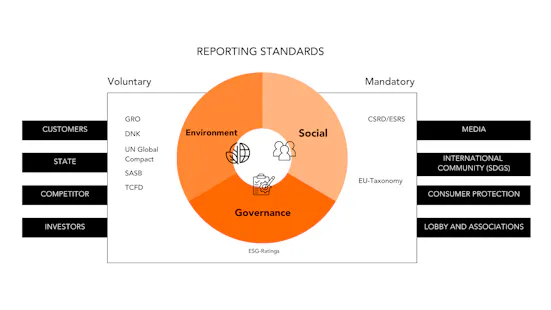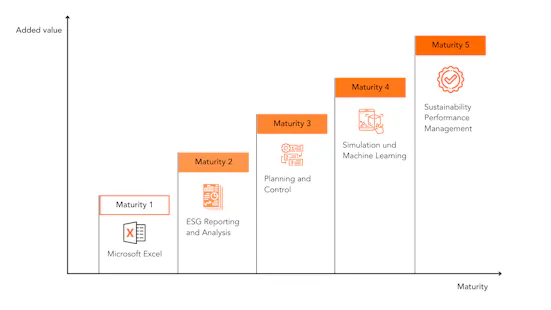
CONSULTING SERVICES
Sustainability Performance Management
Sustainable and intelligent corporate management
-
Modern performance management should take into account financial as well as non-financial performance indicators and key figures.
Mandatory part: ESG Reporting
ESG Reporting as an integral part of sustainability performance management
Sustainable product portfolios and supply chains are becoming increasingly important due to regulatory requirements, as both customers and suppliers are required to operate sustainably. Investors are also subject to regulatory requirements aimed at promoting sustainable business models. By fulfilling their social responsibility, sustainably operating companies promote employee loyalty and increase the likelihood of attracting new employees. Sustainability is therefore a decisive factor for the long-term economic success of your company.
ESG reporting standards
With ESG reporting, companies publish information on performance in the three areas of environment, social affairs and corporate governance. ESG reporting is thus an important pillar for fulfilling the obligation to report on sustainability and to provide internal and external stakeholders with comprehensive information on these three areas.

Systematic improvement of sustainability performance
What does sustainability performance management mean?
ESG reporting is an integral part of sustainability performance management to ensure adequate internal and external reporting. Beyond ESG reporting, sustainability performance management subsumes all processes, methods, information and systems with which a company's sustainability performance can be measured, managed and improved.
Some key features of sustainability performance management are:
Continuous improvement
Sustainability Performance Management is an ongoing iterative process that supports the operationalization of the corporate and sustainability strategy. Starting from the sustainability strategy, the process involves deriving initiatives, setting targets and tracking progress.
Holistic approach
Sustainability performance management takes into account the financial and non-financial impacts and interactions of a company's sustainability-related initiatives. Based on this, actions can be assessed and initiated to reduce negative impacts on the company's performance and enhance positive impacts.
Collaboration and communication
As a rule, stakeholders from across the company work together to contribute to the target picture and thus improve sustainability performance. Transparent communication about sustainability initiatives forms the basis for keeping all stakeholders fully informed about the current status.
Systems-based management
Solutions and methods from the areas of reporting, budgeting, and forecasting are used to track and measure progress toward the sustainability goals that have been set. Modern analytics methods from the areas of simulation and artificial intelligence support the process of identifying opportunities and risks.
Analytics as an accelerator for sustainability performance management
The process of deriving a sustainability strategy with an accompanying materiality analysis (double materiality), as well as the definition of sustainability key figures and targets, generates effort in the first step. A sustainable orientation of the company is often accompanied in the short term by investments for the initiatives, which only lead to a return on investment (ROI) downstream.
The transformation of a company into a sustainable future is a process that is designed for a longer period of time and ties up resources. For this reason, it is necessary to establish an adequate and at the same time automated Sustainability Performance Management. In this way, companies benefit from a regulated approach to continuously improve sustainability performance in a targeted manner and in line with other corporate objectives.
If sustainability performance management is supported by modern analytics solutions, companies will be able to manage sustainability on a data basis. With this integrative and holistically introduced Sustainability Performance Management we promise you:
- Make better decisions in less time
- Be able to inform stakeholders promptly and comprehensively
- Significantly increase your efficiency and transparency in steering toward a sustainable future
Sustainability indicators are the new coporate indicators
Added value of comprehensive sustainability performance management
Sustainability strategy fit
Sustainability performance
Stakeholder requirements
Process efficiency
Steps to sustainability in the company - all from one source
For 20 years, All for One Analytics & Insights GmbH has been supporting its customers in the design and implementation of performance management systems with a focus on financial key performance indicators.
We have consistently expanded our services and competencies as well as our solutions to include non-financial metrics, ESG reporting and sustainability analytics and performance management. All for One Analytics & Insights offers strategy consulting and conceptual support for the following topics in partnership with selected Sustainability Expert:Innen:
- Strategy and materiality analysis
- Definition of sustainability-related goals and derivation of measures
- Determination of strategic and operational control parameters
- Establishment of sustainability management
- Support of sustainability reporting
- Realization of sustainability performance management analytics solutions
- Change and risk management
Our services for sustainability transformation
Step 1
Strategy Consulting
Step 2
Conception of performance management analytics solutions
Step 3
Implementation of performance management analytics solutions
Maturity levels of sustainablity performance management
If you know what level your company is at in the area of sustainability performance management, you can more easily derive the steps that lead to the next level - and make the company even more competitive.
In our numerous discussions with department heads, CIOs, CFOs and sustainability officers, we repeatedly encounter very specific starting positions in which companies find themselves. Based on these observations, we have developed a maturity model that we would like to provide you with here for self-assessment. You can use it to determine where your company stands and which measures will support you in reaching the next level.
Maturity model
Assessment of the current status of sustainability performance management

- Maturity level 1: Sustainability was described in the business area for the first time. Excel serves as a medium for aggregating ESG information and as a basis for reporting.
- Maturity level 2: Sustainability is mentioned several times in the annual report. ESG reporting is system-supported and associated key figures are provided automatically. ESG reporting is standardized on a common information basis.
- Maturity level 3: ESG reporting and sustainability planning and management are system-supported. Financial and non-financial key figures are consolidated in one system and are of adequate quality.
- Maturity level 4: Optimization of the entire control system using modern analytics processes from the areas of simulation and machine learning. Findings for improvement are obtained automatically.
- Maturity level 5: Measures and risks are recorded with system support. Financial and non-financial impacts become visible ad-hoc. The entire performance management process benefits from consolidated information and a high degree of automation.
